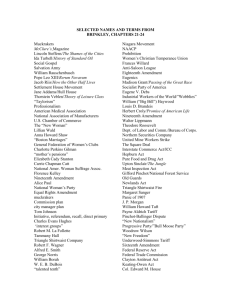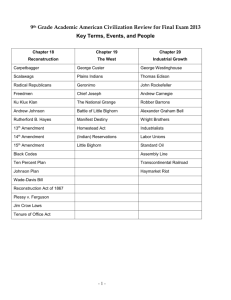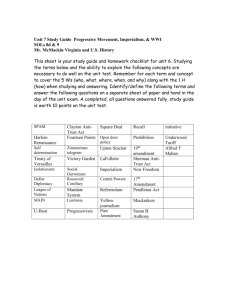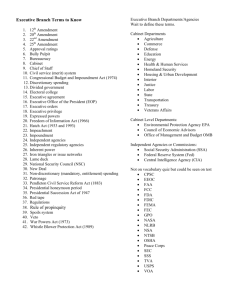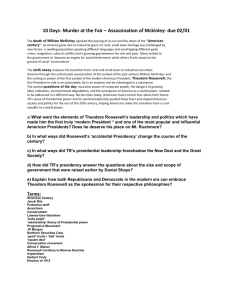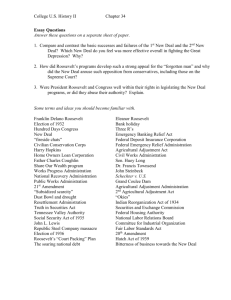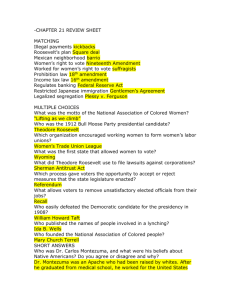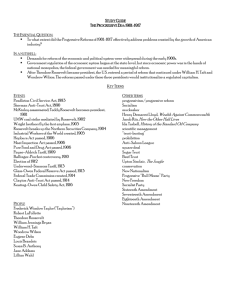Presidential Outline of Major Events
advertisement
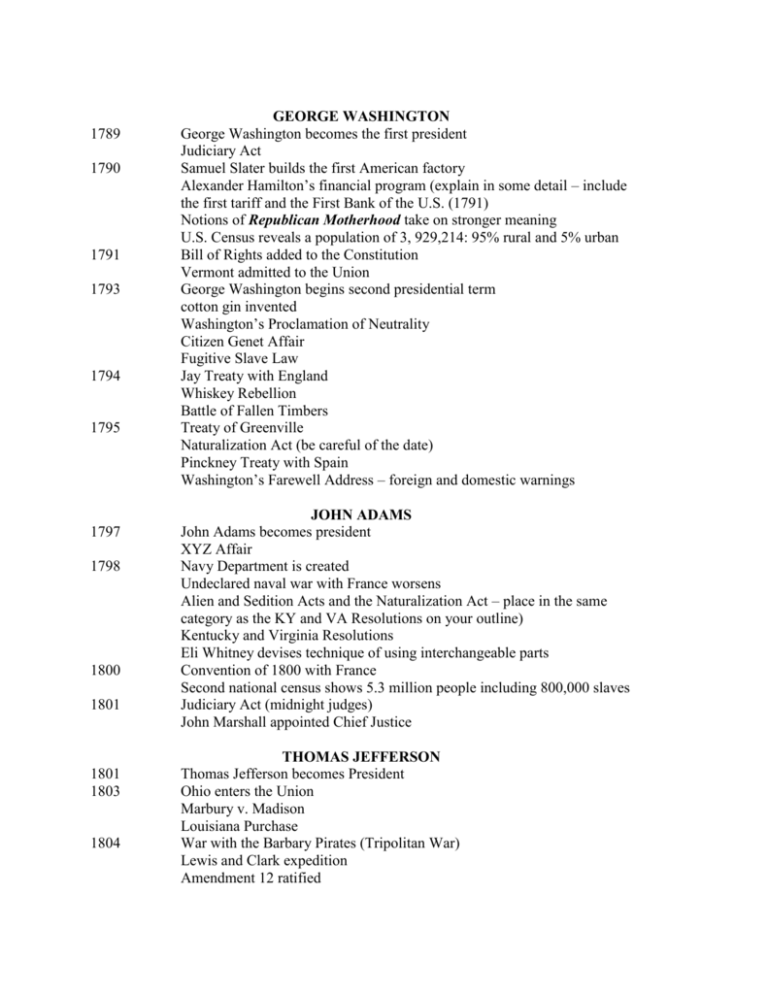
1789 1790 1791 1793 1794 1795 1797 1798 1800 1801 1801 1803 1804 GEORGE WASHINGTON George Washington becomes the first president Judiciary Act Samuel Slater builds the first American factory Alexander Hamilton’s financial program (explain in some detail – include the first tariff and the First Bank of the U.S. (1791) Notions of Republican Motherhood take on stronger meaning U.S. Census reveals a population of 3, 929,214: 95% rural and 5% urban Bill of Rights added to the Constitution Vermont admitted to the Union George Washington begins second presidential term cotton gin invented Washington’s Proclamation of Neutrality Citizen Genet Affair Fugitive Slave Law Jay Treaty with England Whiskey Rebellion Battle of Fallen Timbers Treaty of Greenville Naturalization Act (be careful of the date) Pinckney Treaty with Spain Washington’s Farewell Address – foreign and domestic warnings JOHN ADAMS John Adams becomes president XYZ Affair Navy Department is created Undeclared naval war with France worsens Alien and Sedition Acts and the Naturalization Act – place in the same category as the KY and VA Resolutions on your outline) Kentucky and Virginia Resolutions Eli Whitney devises technique of using interchangeable parts Convention of 1800 with France Second national census shows 5.3 million people including 800,000 slaves Judiciary Act (midnight judges) John Marshall appointed Chief Justice THOMAS JEFFERSON Thomas Jefferson becomes President Ohio enters the Union Marbury v. Madison Louisiana Purchase War with the Barbary Pirates (Tripolitan War) Lewis and Clark expedition Amendment 12 ratified 1805 1806 Jefferson begins second term Zebulon Pike explores the west Non-Importation Act 1807 Chesapeake-Leopard Affair Embargo Act Robert Fulton credited with inventing the steamboat, The Clermont 1808 Slave trade to the U.S. outlawed by law (part of Constitutional Convention Compromise) Non-Intercourse Act 1809 1810 1811 1812 1813 1814 1815 1816 1817 1817 1818 1819 1820 JAMES MADISON James Madison becomes President Fletcher v. Peck Macon’s Bill No. 2 Battle of Tippecanoe Construction of Cumberland Road begun Charter of the First National Bank Expires Louisiana enters the Union Beginning of the War of 1812 (explain the causes) James Madison begins second presidential term Hartford Convention Treaty of Ghent ends War of 1812 Battle of New Orleans Major U.S. imports are woolen and cotton cloth, sugar, and coffee. Main export is cotton. Tariff of 1816 Second Bank of the U.S. chartered First AME Church (African Methodist Episcopal) founded in the U.S. American Colonization society founded JAMES MONROE James Monroe becomes president Beginning of the Era of Good Feelings First Seminole War Rush-Bagot Agreement Mississippi enters the Union Convention of 1818 Illinois enters the Union Transatlantic packet ships average 30 days between New York and McCulloch v. Maryland Financial Panic Adams-Onis Treaty (Transcontinental Treaty) Dartmouth College v. Woodward Alabama enters the Union Missouri Compromise Maine enters the Union Liverpo 1821 1823 1824 1825 1826 1828 1829 1830 1831 1832 1833 1834 1835 1836 Washington Irving publishes “Rip Van Winkle” and “The Legend of Sleepy Hollow” What will become known as the “Hudson River School of Art” begins as American painters seek to develop nationality in Art (1820-1860) – identify some of the painters associated with this movement James Monroe begins second presidential term Missouri enters the Union Monroe Doctrine Henry Clay’s American System Gibbons v. Ogden JOHN QUINCY ADAMS John Quincy Adams becomes President Erie Canal completed (begun in 1817) James Fenimore Cooper publishes The Last of the Mohicans John Audubon publishes Birds of America Tariff of Abominations South Carolina Exposition and Protest Work begins on Baltimore and Ohio Railroad Noah Webster publishes an American dictionary ANDREW JACKSON Andrew Jackson becomes president Cult of domesticity takes root Veto of the Maysville Road Bill Webster-Hayne debate Indian Removal Act Nat Turner’s Rebellion Black Hawk War (1831-32) Peggy Eaton Affair Cherokee Nation v. Georgia First issue of The Liberator published Worcester v. Georgia South Carolina Ordinance of Nullification Jackson’s Proclamation in response to S.C.’s Ordinance of Nullification Veto of Bill to recharter the Second Bank of the U.S. Force Act Andrew Jackson begins second term as president Compromise Tariff Cyrus McCormick invents the reaper Samuel Colt patents the revolver Treaty of New Echota signed with Cherokees Alexis de Tocqueville writes Volume I of Democracy in America Beginning of Second Seminole War (ends in 1842) Texas War for Independence (Include Battle of the Alamo and Battle of San Jacinto) 1837 1837 1838 Railroad” 1839 Specie Circular First McGuffey’s Readers published Arkansas enters the Union Michigan enters the Union Charles River Bridge v. Warren River Bridge John Deere invents the steel tipped plow MARTIN VAN BUREN Martin Van Buren becomes president “Caroline” Affair Mary Lyon founds Mt. Holyoke Female Seminary Financial Panic Oberlin College admits women Aroostook War Trail of Tears Slaves develop escape routes to the North known as the “Underground 1840 Charles Goodyear develops vulcanized rubber Black mutiny on board the Amistad Liberty Party formed in New York Abner Doubleday credited with laying out first baseball diamond at Cooperstown, New York Independent Treasury System established 1841 WILLIAM HENRY HARRISON William Henry Harrison becomes President 1841 1842 1843 Tale Heart” 1844 1845 1845 1846 JOHN TYLER John Tyler becomes President upon Harrison’s death Independent Treasury System repealed Brook Farm established Oregon fever Webster-Ashburton Treaty Slave mutiny aboard the Creole Edgar Allen Poe publishes “The Pit and the Pendulum” and “The TellSamuel F.B. Morse invents the telegraph Texas enters the Union (joint annexation resolution) Florida enters the Union JAMES K. POLK James K. Polk becomes President Slidell Mission to Mexico Elias Howe invents the sewing machine Richard Hoe invents the steam cylinder press 1847 1848 1849 1849 Term “manifest destiny” employed for the first time in article by John L. O’Sullivan Mexican War begins Bear Flag Republic established in California Oregon Treaty with England Wilmot Proviso Walker Tariff Members of the Church of Jesus Christ of Latter Day Saints (Mormons) migrate to Utah Seneca Falls Convention Treaty of Guadalupe-Hidalgo Gold discovered in California Levi’s introduced in America by Levi Strauss Free Soil Party organized Wisconsin enters the Union Elizabeth Blackwell becomes first woman doctor California gold rush ZACHARY TAYLOR Zachary Taylor becomes President Harriet Tubman escapes from slavery MILLARD FILLMORE 1850 Millard Fillmore becomes President when Taylor dies Compromise of 1850, including the Fugitive Slave Law Clayton-Bulwer Treaty Webster’s Seventh of March Speech California admitted to the Union 1851 Herman Melville publishes Moby Dick 1852 Harriet Beecher Stowe’s Uncle Tom’s Cabin published lst compulsory high school education law passed in Massachusetts Commodore Matthew C. Perry visits Japan (1852-54) and negotiates Treaty of Kanagawa 1853 1854 1856 FRANKLIN PIERCE Franklin Pierce becomes President Gadsden Purchase Kansas-Nebraska Act Ostend-Manifesto Republican Party organized Civil War in Bleeding Kansas Pottawatomie Massacre Bessemer Process developed Sen. Charles Sumner attacked by Rep. Preston Brooks 1857 1858 1859 1860 1861 1861 1862 Donelson 1863 1864 1865 JAMES BUCHANAN James Buchanan becomes President Dred Scott decision Impending Crisis of the South by Hinton Helper published Harper’s Weekly begins publication Financial Panic Lincoln’s House Divided Speech in the Lincoln-Douglas Debates (include the Freeport Doctrine) Macy’s Department Store opens in New York City Minnesota enters the Union Comstock Lode discovered Edwin L. Drake drills first oil well John Brown’s Raid on Harper’s Ferry, Virginia Oregon enters the Union South Carolina’s Ordinance of Secession Crittenden Amendments Proposed Pony Express Organized Kansas enters the Union Confederate States of America created by new Confederate constitution U.S. railroad track mileage estimated at 30,000 miles ABRAHAM LINCOLN Abraham Lincoln becomes President Beginning of the War between the States First Battle of Bull Run Trent Affair Morill Tariff Act Battle of Monitor and Merrimac Morrill Land Grant College Act Homestead Act Greenbacks issued under Legal Tender Act Confederacy enacts first conscription law in U.S. history Battles of Shiloh, Fredericksburg, Antietam Murfreesboro, and Fort Emancipation Proclamation Enrollment Act of 1863 passed by Congress (conscription) Battles of Gettysburg and Vicksburg Draft Riots in New York City National Banking Act Battles of Chancellorsville, Chickamauga, and Missionary Ridge Wade-Davis Bill Sand Creek Massacre(Colorado) Atlanta Campaign Wilderness Campaign and the Siege of Petersburg Abraham Lincoln begins second term Hampton Roads Conference Surrender at the city of Appomattox Courthouse, Virginia End of War Between the States Freedmen’s Bureau established President Lincoln assassinated 1865 1866 1867 1868 1869 1870 1871 1872 1873 ANDREW JOHNSON Andrew Johnson becomes President Beginning of the Johnson Reconstruction Era 13th Amendment ratified Black Codes passed in many Southern states Maximilian Affair in Mexico Ku Klux Klan organized Atlantic Cable (Cyrus Field) Second Freedmen’s Bureau Act (passed over Johnson’s veto) Civil Rights Act (passed over Johnson’s veto) First Reconstruction Act Tenure of Office Act and Command of the Army Act (both passed over Johnson’s Veto) Purchase of Alaska Horatio Alger begins publishing his stories Patrons of Husbandry (the Grange) is organized Impeachment and Trial of Andrew Johnson Amendment 14 ratified ULYSSES S. GRANT Ulysses S. Grant becomes President Tweed Ring operates in New York City Political cartoons by Thomas Nast expose the Tweed Ring Black Friday Scandal Prohibition Party organized First Transcontinental RR completed (Central Pacific and Union Pacific) Knights of Labor organized Wyoming becomes first state to extend full voting rights to women National Woman Suffrage Association founded to compete with newly founded American Woman Suffrage Association Amendment 15 ratified John D. Rockefeller forms the Standard Oil Company Treaty of Washington (Alabama Claims) Force Act (also known as the Ku Klux Klan Act) Amnesty Act Credit Mobilier Scandal Liberal Republican party organized Yellowstone National Park created, the idea of George Catlin Ulysses S. Grant begins second presidential term Financial Panic 1874 1875 1876 1877 1877 1878 1879 1880 1881 1881 1882 1883 1884 1885 Demonetization Act (The Crime of ’73) New York City’s Boss Tweed convicted of fraud Greenback Party organized Barbed wire invented by Joseph Glidden Civil Rights Act Whiskey Ring Scandal Belknap Scandal Battle of Little Big Horn Sioux War (1875-1876) ends Alexander Graham Bell invents the telephone Disputed Election of 1876 leads to Compromise of 1877 Mark Twain publishes The Adventures of Tom Sawyer RUTHERFORD B. HAYES Rutherford B. Hayes becomes President as a result of the Compromise of End of the Reconstruction Era Munn v. Illinois (Granger case) Thomas Edison invents the phonograph Railroad Strike Riots along the East Coast Bland-Allison Act Thomas Edison invents the electric light Pap Singleton leads Black Exodusters to Kansas Census shows a population of 50.1 million people JAMES A. GARFIELD James A. Garfield becomes President James A. Garfield assassinated CHESTER ALAN ARTHUR Chester A. Arthur becomes President Clara Barton founds the American Red Cross Booker T. Washington founds Tuskegee Institute Helen Hunt Jackson’s book, A Century of Dishonor, is published Chinese Exclusion Act John D. Rockefeller organizes the Standard Oil Trust Pendleton Act Jan Matzeliger revolutionizes the American shoe industry Civil Rights Cases argued before the Supreme Court Brooklyn Bridge opens in New York Home Life Insurance Building opens in Chicago (Think about how this relates to 9/11/01) GROVER CLEVELAND Grover Cleveland becomes President Contract Labor law 1886 1887 1889 1890 1891 1892 Ottmar Mergenthaler invents the linotype machine Haymarket Square Riot (Chicago) End of Apache War that began in 1871 New Presidential Succession Act American Federation of Labor founded Wabash RR v. Illinois (Granger case) Interstate Commerce Act Dawes Severalty Act BENJAMIN HARRISON Benjamin Harrison becomes President First Pan American Conference held Jane Addams establishes Hull House North and South Dakota, Montana, and Washington admitted to the Union T. Thomas Fortune founds the Afro-American League Dependent and Disability Pensions Act McKinley Tariff Sherman Anti-Trust Act Sherman Silver Purchase Act Battle of Wounded Knee Frontier comes to an end (see Frederick Jackson Turner, “The Significance of the Frontier in American History”) Boley and other all black towns established in Oklahoma (1889-1910) Yosemite and Sequoia National Parks established Idaho and Wyoming admitted to the Union Populist Party organized Homestead Strike Populist Party draws up Omaha Platform (be sure to list the ideas in the platform) Ida B. Wells strikes out against lynching and is driven from Memphis 1893 1894 1895 GROVER CLEVELAND Grover Cleveland becomes President for a second time Financial Panic Sherman Silver Purchase Act repealed Grover Cleveland opposes annexation of Hawaii Jacob Coxey leads March on Washington McClure’s Magazine founded Dr. Daniel Hale Williams performs open heart surgery Pullman Strike Wilson-Gorman Tariff Thomas Edison invents motion pictures Booker T. Washington’s Atlanta Compromise Speech In Re Debs (Supreme Court Case) Venezuelan Boundary Dispute U.S. v. E.C. Knight Co. 1896 Pollock v. Farmers’ Loan and Trust Co. Sears, Roebuck Company opens a mail order business William Jennings Bryan’s Cross of Gold Speech Plessy v. Ferguson George Washington Carver joins the faculty of Tuskegee Institute as a chemist 1897 1898 1899 1900 1901 1901 1902 1903 1904 1905 WILLIAM MCKINLEY William McKinley becomes President Dingley Tariff Klondike Gold Rush DeLome Letter Spanish American War begins Teller Resolution Hawaiian Islands annexed Treaty of Paris First Grandfather Clause (Louisiana) Open Door Policy Boxer Rebellion Gold Standard Act Foraker Act Socialist Party organized in the U.S. Up From Slavery by Booker T. Washington published Census shows U.S. population is 75.9 million. Life expectancy is 48 years for males and 51 years for females William McKinley begins second presidential term William McKinley assassinated THEODORE ROOSEVELT Theodore Roosevelt becomes President J.P. Morgan organizes the U.S. Steel Corp. Platt Amendment passed Venezuelan Debt Dispute Newlands Reclamation Act Northern Securities Case Anthracite Coal Strike Wright brothers make first airplane flight Elkins Act W.E.B. DuBois publishes The Souls of Black Folk Panamanian Revolution from Colombia Alaska Boundary dispute settled Construction of Panama Canal begins Roosevelt Corollary announced Theodore Roosevelt begins second term Lochner v. New York 1906 1907 1908 1909 Santo Domingo (Dominican Republic) Debt Dispute First Niagara Conference (Niagara Movement) Roosevelt awarded Nobel Peace Prize for settling the Russo-Japanese War Hepburn Act Meat Inspection Act and Pure Food and Drug Act Gentleman’s Agreement Financial Panic Oklahoma admitted to the Union Root-Takahira Agreement National Conservation Commission established Muller v. Oregon (write about the Brandeis brief) First Model T Fords roll off the assembly line Jack Johnson becomes heavyweight champion of the world WILLIAM HOWARD TAFT William Howard Taft becomes President National Association for the Advancement of Colored People is established 1910 1911 Company 1912 1913 1914 1915 Payne-Aldrich Tariff Ballinger-Pinchot Controversy Dollar Diplomacy pursued by Taft administration Mann-Elkins Act (Do not confuse this with the Mann Act) Supreme Court applies the “rule of reason” to anti-trust cases National Urban League founded Dismantling of the American Tobacco Company and the Standard Oil Magdalena Bay Incident (Lodge Corollary to the Monroe doctrine) Progressive Party (Bull Moose Party) organized Garrett A. Morgan invents the gas mask Arizona and New Mexico admitted to the Union Amendment 16 ratified WOODROW WILSON Woodrow Wilson becomes President Henry Ford’s first full assembly line begins producing cars in Highland Armory Exhibition in New York City (art) Amendment 17 ratified Federal Reserve Act Watchful Waiting Policy (Mexico) Underwood Tariff Federal Trade Commission established Tampico Incident Proclamation of Neutrality at outbreak of WWI Panama Canal completed Clayton Anti-Trust Act “Birth of a Nation” is released (D.W. Griffith) Park, outside D 1916 1917 1918 1919 1920 1921 1922 1923 Adamson Act Sussex Pledge Margaret Sanger opens first U.S. birth control clinic Jeannette Rankin becomes the first woman elected to the House of Representatives Keating-Owen Act Black Tom Explosion Wilson begins second presidential term Zimmerman Note U.S. enters WW I (give causes of American entry into the war) Literacy Test Act (immigration) Selective Service Act Marcus Garvey founds the Universal Negro Improvement Association Espionage Act Virgin Islands Purchased Wilson’s Fourteen Points Hammer v. Dagenhart Sedition Act Armistice ending WWI Influenza epidemic begins Paris Peace Conference Versailles Treaty Amendment 18 is ratified (Volstead Act) Boston Police Strike A. Mitchell Palmer begins “Palmer Raids” (Red Scare) Schenck v. U.S. Abrahms v. U.S. Communist Party organized in U.S. World Court established Amendment 19 is ratified WARREN G. HARDING Warren G. Harding becomes President Dillingham Immigration Act (Immigration Act of 1921) Washington Disarmament Conference begins William Howard Taft appointed Chief Justice of the U.S. Supreme Court Harlem Renaissance begins with the musical comedy “Shuffle Along” Bailey v. Drexel Furniture Co. (child labor) Fordney-McCumber Tariff Act Capper-Volstead Act CALVIN COOLIDGE Calvin Coolidge comes President Adkins v. Children’s Hospital Garrett Morgan patents the traffic light Marcus Garvey begins his “Back to Africa” movement 1924 1925 1927 1928 1929 1930 1931 1932 1933 1934 Bonus Bill (veterans) Calvin Coolidge begins second presidential term Immigration Act of 1924 (Johnson-Reed Act) Revenue Acts of 1924 and 1926 Dawes Plan Teapot Dome Scandal Approximately 2.5 million radios are in use in the U.S. McNary-Haugen Farm bill vetoed by Coolidge Scopes Trial (Be sure to include the attorneys and the side each was on.) Brotherhood of Sleeping Car Porters organized by A. Phillip Randolph Cotton picker invented Charles Lindbergh makes solo flight across the Atlantic Ocean Sacco and Vanzetti executed Kellogg-Briand Pact HERBERT HOOVER Herbert Hoover elected President Vladimir Zworkykin demonstrates the first practical television Agricultural Marketing Act Beginning of the Great Depression (include causes) Young Plan Wickersham Commission Report Hawley-Smoot Tariff London Naval Conference Hoover Moratorium on War Debts Scottsboro Affair (Powell v. Alabama) Empire State and Chrysler Buildings are completed Stimson Doctrine Reconstruction Finance Corporation established Norris-LaGuardia Anti-Injunction Act Bonus Army marches on Washington, D.C. Amendment 20 is ratified FRANKLIN D. ROOSEVELT (Domestic only) Franklin D. Roosevelt begins becomes President 13 million Americans unemployed National Bank holiday is proclaimed Beginning of the First New Deal Agricultural Adjustment Act Tennessee Valley Authority National Industrial Recovery Act Gold Repeal Resolution Amendment 21 repeals Amendment 18 Civilian Conservation Corps established Farm Credit Administration established Securities and Exchange Act 1935 1936 1937 1938 1939 1940 1941 1942 1943 1944 Federal Communications Act Reciprocal Tariff Act First Farm Mortgage Moratorium Act Townsend’s Old Age Revolving Pension Plan Huey Long’s Share Our Wealth Society Wheeler-Howard Act (Indian Reorganization Act) Democratic victories in Congressional elections Father Charles Coughlin’s National Union for Social Justice Federal Housing Administration is established Beginning of the Second New Deal Emergency Relief Appropriations Act Works Progress Administration Schechter v. U.S. (sick chicken case) National Labor Relations Act (Wagner Act) Glass-Steagall Banking Act Social Security Act Huey Long assassinated Committee for Industrial Organization established (CIO) U.S. v. Butler Franklin D. Roosevelt begins second presidential term United Auto Workers’ sit down strikes Court Packing Plan National Labor Relations Board v. Jones and Laughlin Farm Security Administration Business recession begins (1937-39) AFL expels CIO unions - Congress of Industrial Organization formed Fair Labor Standards Act Pure Food, Drug, and Cosmetic Act Second Agricultural Adjustment Act 10.4 million Americans unemployed Marian Anderson’s concert at the Lincoln Memorial Burke-Wadsworth Act (conscription) Smith Act Roosevelt begins third presidential term March on Washington Movement Fair Employment Practices Committee established National War Labor board established Internment of more than 110,000 Japanese Americans War Production Board established Manhattan Project established Irving Berlin writes “White Christmas” Rationing of sugar, coffee, butter, meat, cheese, and gasoline begins War Labor Disputes Act (Smith-Connally Anti-Strike Act) Race riots in Detroit, Harlem, and 45 other cities Korematsu v. U.S. Serviceman’s Readjustment Act passed (G.I. Bill) 1945 1933 1934 1935 1936 1937 1939 1940 1941 1942 1943 1944 1945 1945 1946 Roosevelt begins fourth presidential term Roosevelt dies; Truman assumes the Presidency FRANKLIN D. ROOSEVELT (Foreign Policy only) Roosevelt becomes President Good Neighbor Policy announced Independence Act for the Philippine Islands Platt Amendment abrogated Nye Committee Hearings Begin (1934-1936) First Neutrality Act Pan-American Conference Roosevelt begins second term Cash and Carry Neutrality Act World War II begins in Europe as Germany invades Poland Neutrality Act of 1937 is amended France signs armistice with Germany Destroyer for Military Bases Exchange Roosevelt begins third presidential term Four Freedoms Address Lend Lease Act Hitler attacks the U.S.S.R. Atlantic Charter Japanese attack on Pearl Harbor U.S. declares war on Japan (be sure to include immediate specific actions the U.S. takes against the Japanese) Corregidor surrenders to Japanese Battles of Bataan, Coral Sea, Guadalcanal U.S. forces invade North Africa with the Allies (Operation Torch) Allied Invasion of Italy Cairo Conference Teheran Conference D-Day (Operation Overlord) France is liberated Dumbarton Oaks Conference Roosevelt begins fourth presidential term Yalta Conference Roosevelt dies HARRY S. TRUMAN Harry S. Truman becomes president upon death of F.D.R. First atomic bomb exploded Potsdam Conference San Francisco Conference World War II ends with the Surrender of Germany (May) and Japan (August) after atomic bombs are dropped on Hiroshima and Nagasaki Philippine Islands become independent 1947 1948 1949 1950 1951 1952 1953 1954 Republicans win both houses of Congress Employment Act Atomic Energy Commission is established National Security Act New Presidential Succession Act Taft-Hartley Act Truman orders loyalty probe Marshall Plan Truman Doctrine Jackie Robinson enters Major League Baseball “To Secure These Rights” is issued by the Presidential Commission on Civil Rights Displaced Persons Act (immigration) State of Israel founded Truman appoints Presidential Commission on Equality of Opportunity in the Armed Services Berlin Blockade Selective Service Act North Atlantic Treaty Organization Point Four Program Communist victory in China NSC-68 delivered to President Truman Korean War begins Alger Hiss convicted of perjury Senator Joseph McCarthy (R-Wisc.) alleges communists in government McCarran Internal Security Act Amendment 22 is ratified Ethel and Julius Rosenberg convicted of conspiring to commit espionage Hydrogen bomb exploded President Truman seizes the steel mills: Youngstown Sheet and Tube Co. v. Sawyer DWIGHT DAVID EISENHOWER Dwight Eisenhower becomes President U.S. helps restore the shah to power in Iran Korean War ends Department of Health, Education, and Welfare created Earl Warren becomes Chief Justice of the Supreme Court Army-McCarthy hearings Siege of Dienbienphu in Vietnam; Geneva Accords signed, U.S. refuses to accept them Southeast Asia Treaty Organization formed (SEATO) Brown v. Board of Education of Topeka, Kansas Both U.S. and U.S.S.R. have H bombs C.I.A. takes covert action in Guatemala Jinmen(Quemoy)-Mazu (Matsu) crisis occurs/Formosa Resolution 1955 AFL-CIO is organized Rosa Parks’ action leads to Montgomery Bus Boycott Marian Anderson becomes first black to sing at the Metropolitan Opera U.S. backs Diem Regime in Vietnam 1956 Suez Crisis Federal Highway Act Hungarian Revolution occurs Elvis Presley wins national fame with such songs as “Heartbreak Hotel” 1957 Eisenhower begins second term Civil Rights Commission created by Civil Rights Act of 1957 Sputnik in orbit Eisenhower Doctrine Federal troops sent to Central High in Little Rock, Arkansas 1958 Explorer I in orbit U.S. Marines sent to Lebanon 1959 Congress admits Alaska and Hawaii to the Union Cuban Revolution, Castro ousts Batista Soviets shoot down U-2 spy plane 1960 Sit ins begin with a sit in at the Woolworth Department Store in Greensboro, N.C. 1961 Eisenhower’s Farewell Address (Eisenhower’s administration was characterized by a domestic policy known as “Modern Republicanism” and foreign policies of “brinksmanship” and “massive retaliation”.) 1961 1962 1963 JOHN FITZGERALD KENNEDY John F. Kennedy becomes president “New Frontier” domestic program is announced Peace Corps organized Amendment 23 is ratified Alliance for Progress Bay of Pigs Invasion Berlin Wall built Mapp v. Ohio decided Civil rights Freedom Rides begin (CORE) First American astronaut orbits the earth U.S. troops sent to South Vietnam Students for a Democratic Society Port Huron statement Cuban Missile Crisis James Meredith enters the University of Mississippi Betty Friedan’s The Feminine Mystique is published Nuclear Test Ban Treaty March on Washington; M.L. King’s “I Have a Dream Speech” Bombing of Birmingham’s 16th St. Baptist Church John F. Kennedy is assassinated 1963 1964 1965 LYNDON BAINES JOHNSON Lyndon Johnson becomes President upon Kennedy’s death Beatles perform in the U.S. Economic Opportunity Act launches the War on Poverty Civil Rights Act Amendment 24 is ratified Gulf of Tonkin Resolution Mississippi Freedom Summer (civil rights) Race riots occur in many northern cities Johnson begins second term - announces the “Great Society” domestic program (Please make sure that you identify all the specific programs of the Great Society.) Malcolm X assassinated Civil rights March from Selma to Montgomery, Alabama (Bloody Sunday) 1966 1967 Detroit. 1968 1969 1970 Anti-war protests begin Voting Rights Act Medicare established Escalation of the war in South Vietnam Department of Housing and Urban Development created Stokely Carmichael calls for Black Power National Organization for Women (NOW) is created Black Panthers’ Organization is founded Racial disturbances occur in several large cities notably Newark and Amendment 25 is ratified Siege of Khe Sanh Tet Offensive My Lai Massacre occurs but is not yet revealed (Vietnam) Martin Luther King is assassinated Student Anti-war protests escalate - Columbia University students seize the campus Robert Kennedy is murdered Violence occurs at the Democratic National Convention in Chicago Richard Nixon elected president RICHARD M. NIXON Richard Nixon becomes President Men land on the moon My Lai massacre revealed 543,400 U.S. troops in Vietnam - Nixon begins their withdrawal Nixon “Silent Majority” speech Woodstock Festival Nixon Doctrine Detente Policy announced U.S. troops invade Cambodia on orders of Nixon 1971 1972 1973 1974 1974 1975 1976 1977 Students killed at Kent State and Jackson State Universities Environmental Protection Agency is established Amendment 26 is ratified Lt. William Calley court-martialed for the My Lai Massacre Pentagon Papers are published Nixon’s New Economic Program New China policy announced Revelation of Watergate scandals begins Nixon visits Communist China Senate passes Equal Rights Amendment John Mitchell resigns as chairman of CREEP (Committee to Re-elect the President) George Wallace, candidate for president, is shot in Laurel, MD. Richard Nixon begins second term as president Vice President Agnew forced to resign; Gerald Ford is appointed Vice Roe v. Wade Wounded Knee Incident Arab oil embargo Existence of White House tapes is revealed Saturday Night Massacre War Powers Act Impeachment hearings begin President Nixon resigns GERALD R. FORD Gerald Ford becomes president upon Nixon’s resignation Nelson Rockefeller appointed as Vice President Ford pardons Richard Nixon Ford’s Whip Inflation Now (WIN) Policy is announced Two assassination attempts on Ford by women in California are thwarted by the Secret Service Government of South Vietnam surrenders to North Vietnam Former Attorney General Mitchell and presidential aides Haldeman and Ehrlichman are sentenced to prison for their roles in Watergate Celebration of the “Bicentennial Year” JIMMY CARTER Jimmy Carter becomes President Roots by Alex Haley serialized on television Star Wars released Resurgence of Christian fundamentalism Pardons granted to draft evaders of the Vietnam War Government Spending Program to alleviate unemployment announced Trans-Alaska Pipeline opens Department of Energy created Human Rights Policy is announced President 1978 1979 1980 Bakke v. University of California Panama Canal treaties Camp David Accords U.S. and China establish full diplomatic relations Moral Majority established by Jerry Falwell Accident at Three Mile Island, Pennsylvania U.S.-China diplomatic recognition finalized Soviet Union invades Afghanistan Iranians storm U.S. Embassy in Teheran and seize hostages Space vehicle Voyager II photographs Jupiter Boat people flee Vietnam Department of Education is created Carter Doctrine Inflation continues as consumer prices rise 13.3% in 1979 and recession continues Attempt to rescue Iranian hostages fails U.S. announces boycott of summer Olympic game in Moscow (make sure you explain why) Peacetime draft registration is begun “Superfund” created to pay for cleaning up toxic waste sites Women graduate from U.S. military academies for the first time (significance?) Prime rate of interest is at 21.5 percent 1981 1982 1983 1984 RONALD W. REAGAN Ronald Reagan becomes President AIDS first observed in the U.S. Economic Recovery Tax Act Economic recession, unemployment at 8 percent U.S. steps up role in El Salvador INF talks begin Sandra Day O’Connor appointed to the U.S. Supreme Court Space shuttle flights begin Prime rate of interest at 14 percent* U.S. troops are ordered to Lebanon Unemployment at 10.1 percent* U.S. aid to Contras in Nicaragua is revealed Voting Rights Act of 1965 is renewed Prime rate of interest at 10.5 percent* Strategic Defense Initiative (Star Wars) is announced More than half of women over 20 are holding jobs outside the home Equal Rights Amendment dies unratified by 3/4 of the states (why?) Terrorists kill U.S. marines in Lebanon Invasion of Grenada Sally Ride becomes first American woman in space U.S. marines leave Lebanon 1985 1986 1987 1988 C.I.A. mines Nicaraguan harbors Unemployment drops to 7.1 percent; interest rates fall* USSR boycotts Los Angeles Olympics AT&T broken up Ronald Reagan begins second presidential term Reagan Doctrine announced Gorbachev comes to power in the Soviet Union U.S. bombers attack Libya Tax Reform Act Space Shuttle Challenger disaster Republicans lose control of the Senate Iran-Contra scandal breaks One day drop of 508 points in the stock market U.S.-Canada Free Trade Agreement Agreement on Soviet withdrawal from Afghanistan Moscow Summit meeting “Understanding AIDS” mailed to 107 million households
